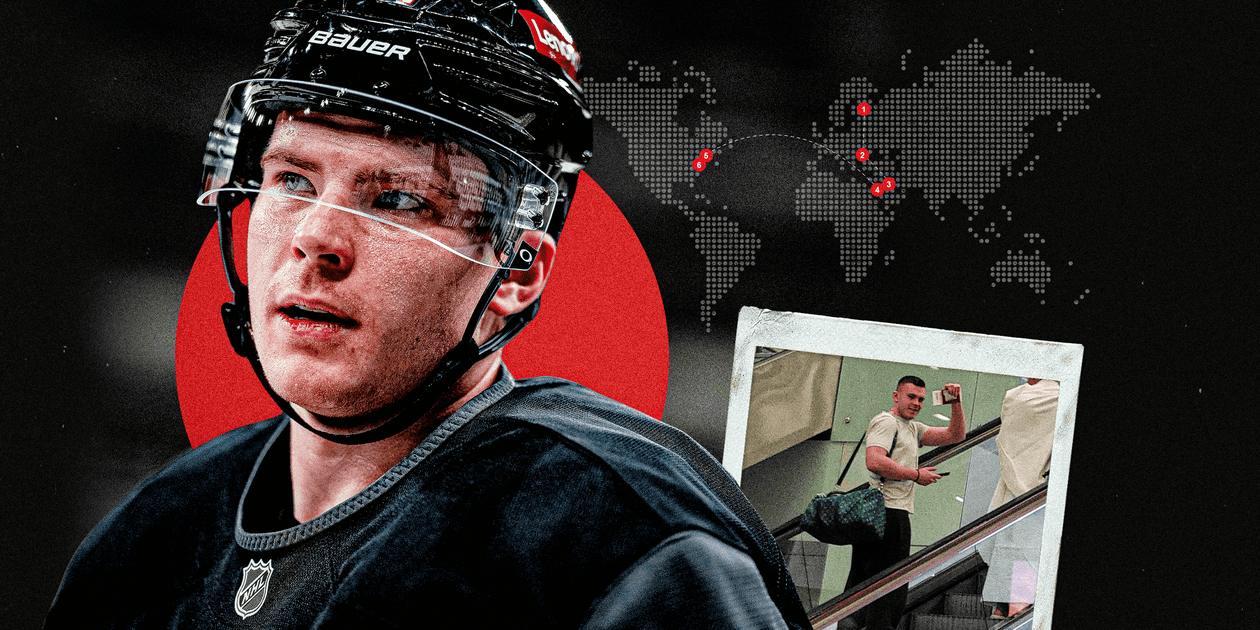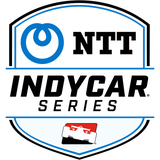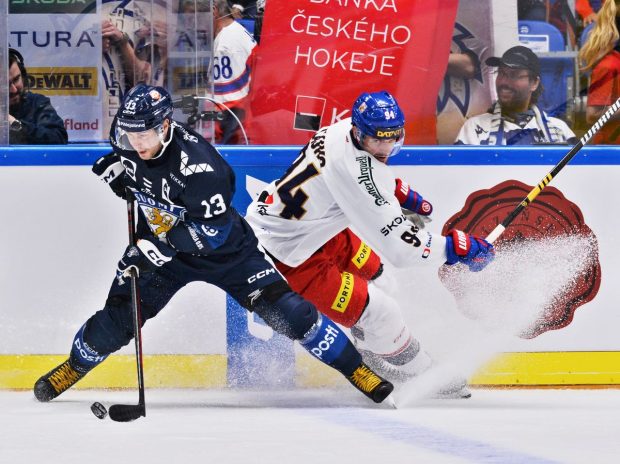

Alexander Nikishin walked out of the American embassy on April 17 in Riyadh, Saudi Arabia, a downtrodden look on his face. He headed toward Oleg Smirnov, a Carolina Hurricanes scout from Russia who had accompanied him, and delivered the news. The consulate needed a couple more hours to add a P-1 visa to Nikishin’s Russian passport, he told Smirnov. His journey to the U.S. would have to wait a little while longer.
Advertisement
Smirnov instantly began to stress. In the days leading up to the NHL playoffs, the Hurricanes were trying to get Nikishin to Raleigh as quickly as possible. The process had already included sleepless nights for Hurricanes employees, political favors and a stop in Istanbul. What could the problem be now?
“I got another white hair in my beard,” Smirnov says.
Seeing the scout start to worry, Nikishin broke into a grin.
“I’m joking!” he shouted in Russian. He had his passport with the P-1 visa inside it. At long last, he could go to America.
NHL teams are used to navigating immigration processes. When a European player gets moved across the Canada-U.S. border at the trade deadline, for example, it can take days to sort out a player’s visa before he can debut.
Nikishin’s situation was more complicated. The Hurricanes wanted to expedite the process, and he also was coming from his native Russia, where his KHL season with SKA St. Petersburg had just ended. Russia’s invasion of Ukraine has affected its diplomatic relations with countries around the globe, adding further hurdles.
Carolina selected Nikishin in the third round of the 2020 NHL Draft. Over the next 4 1/2 years, he developed into one of the best young defensemen in the KHL and one of the NHL’s top prospects. Now 23 with a 6-foot-4, 216-pound frame, he finished third league-wide in points by a defenseman in 2024-25 and captained a SKA St. Petersburg team that featured multiple former NHLers. In Hurricanes general manager Eric Tulsky’s eyes, he’s been NHL-ready for “at least a year, maybe two.”
Nikishin has been with the Hurricanes for nearly two weeks. Debuting in the NHL during the playoffs is a big jump, especially for someone navigating a language barrier, so he did not appear in Carolina’s five-game series win against the New Jersey Devils. Heading into the second round, he is likely the next player in if a Hurricanes defenseman gets hurt or if coach Rod Brind’Amour wants to make a lineup change.
His availability is all possible because of a six-day journey that took him more than 10,000 miles across six cities in three continents. It offers a look at how NHL teams navigate immigration — and the lengths they will go to make sure a player can get to them as quickly as possible.
April 4 to 11: Endings and beginnings
Tulsky watched every game of SKA’s first-round matchup with Dynamo Moscow in the KHL playoffs. He didn’t just want to see how Nikishin was doing as the calendar turned to April. He also wanted to know when the prized prospect would be available. Nikishin’s KHL contract ran through the 2024-25 season, and the faster SKA’s season ended, the faster Carolina could potentially get him to America.
Advertisement
As the series went on, Tulsky and the Hurricanes ramped up negotiations with Nikishin’s camp. The sides eventually settled on a two-year entry-level contract that would “burn” the 2024-25 season, allowing him to hit restricted free agency with arbitration rights in the summer of 2026.
To get Nikishin over, the team needed to file a petition for a non-immigrant worker, get it approved and then have him go through an interview at a U.S. consulate, where he would get a P-1 visa added to his passport. The P-1 classification is for athletes, entertainers and artists.
The Hurricanes started working on immigration paperwork in March. Executive coordinator Anna Yount and compliance assistant Earl Schwartz filled out the petition, a 38-page document, as well as an expedited processing request.
“It’s pretty hefty,” Schwartz says. “It’s got a lot of info in there and a lot of places you can get something wrong.”
When the front office reached an agreement with Nikishin, it jumped into action. On April 4, Yount mailed the petition to the U.S. Citizenship and Immigration Services agency.
Two days later, across the globe in St. Petersburg, SKA lost Game 6 of its first-round series with Dynamo Moscow. Nikishin played nearly 29 minutes in the game. After it ended, he skated to the glass and pushed his stick to a young fan in the front row. Then he skated off the ice for the final time.
The next day, on April 7, the USCIS received the petition from the Hurricanes. The USCIS still needed to approve it, meaning the Hurricanes could not yet start arranging an interview for Nikishin at a consulate.
As they waited, SKA announced April 11 that the club and Nikishin had mutually terminated his contract, which ran through the end of May. The same day, Carolina posted on X that it had signed Nikishin, though at that point he had technically not signed but merely had agreed to terms. (The Hurricanes wanted to leave options open for him to sign a professional tryout and play in the AHL before joining the playoff roster.)
Advertisement
Nikishin remained in St. Petersburg. Carolina was hoping to get approval by April 11, a Friday and the last day of the business week.
When that didn’t happen, the Hurricanes began planning for how to make the process go as quickly as possible early the next week. That meant it was time to get Nikishin moving.
April 13 to 15: A waiting game in Istanbul
Looking at a map, Helsinki would make perfect sense as a spot for Nikishin to wait for a petition to get approved. St. Petersburg is less than 200 miles away, just over the Gulf of Finland. But because of European Union sanctions on Russia, that wasn’t an option.
The Hurricanes had to look outside the European Union. They settled on Istanbul, the capital of Turkey. Istanbul straddles Europe and Asia — the Bosporus Strait, which runs through the city, is the dividing line between the two continents — but Turkey is not part of the EU.
“Istanbul is great because you can get flights there and it’s a spot that goes to a lot of other places,” says Hurricanes assistant general manager Tyler Dellow. “It lets us move quickly once we know what we need to do.”
Mallory Wilmoth, a team operations assistant, has an office on the fourth floor of the Lenovo Center, right near the Hurricanes’ brass. In the days after mailing out the petition, Tulsky, Dellow and front-office members walked by her desk and gave her a heads-up that the process might start heating up. She’d be involved.
When the front office gave her the go-ahead, Wilmoth booked Nikishin an April 13 flight from St. Petersburg to Istanbul. She thought she’d have a harder time booking a flight out of Russia but found it relatively simple using Turkish Airlines. She switched the website language over to English, reserved a ticket for Nikishin and put the information in a WhatsApp group chat with the defenseman, Dellow and Ben Kreyzerman, an operations manager at Quartexx, the agency that represents Nikishin.
Advertisement
Kreyzerman knows Russian, but technology proved instrumental for Wilmoth and Dellow as they communicated with Nikishin throughout his travels.
“I’m just literally translating chunks of text in Google Translate and then pasting it into the app and hoping that Google Translate is good,” Dellow says.
Nikishin traveled from St. Petersburg to Istanbul on April 13. The Hurricanes hoped they would get their petition approved on Monday, April 14, so they booked him a hotel near the airport.
But April 14 came and went, and the Hurricanes still hadn’t heard back on the petition. After Nikishin had spent two nights in the city, they moved him to the Old City part of Istanbul — a nicer area to stay than an airport hotel and not far from skating rinks. Nikishin took in the sights while there, wandering around the city and stopping for Turkish ice cream — all while waiting for his next step.
“He was calling me on an hourly basis asking where things are standing,” Kreyzerman says. “Just super eager to come over.”
Nikishin had his hockey equipment, and he asked Hurricanes staffers about getting ice access. As his stay extended, Dellow called a few hockey rinks in Istanbul to try to arrange ice time, but he did not connect with English speakers.
That didn’t end up mattering. With the petition taking longer than expected, Hurricanes CEO Brian Fork reached out to the offices of North Carolina’s U.S. senators, Thom Tillis and Ted Budd, for assistance.
“We requested for the underlying petition to be expedited at USCIS,” says Daniel Keylin, a Tillis senior adviser. “USCIS agreed and approved the petition the same day.”
At 3 p.m. Eastern on April 15, the Hurricanes received the approval on their petition. Finally, they could start looking for a consulate appointment.
April 15 to 17: Consulate dealings
When evaluating where to send Nikishin for a consulate appointment, the Hurricanes’ primary focus was speed. They looked at the state department’s website for interview wait times and considered trying for appointments in Kazakhstan, the Bahamas and Serbia, Schwartz says. Dellow remembers Bangkok coming up as an option, too. Ultimately, the Hurricanes deemed Riyadh would be their best bet.
Advertisement
The earliest date they could get scheduled was May 7, but they filed an emergency request to move it up. Dellow stayed up late so he could get in touch with the consulate as soon as it opened at 8 a.m. Riyadh time (1 a.m. Eastern).
“I am sort of living with a foot in both time zones at this point,” Dellow says.
Initially, the consulate said it could move the appointment up to April 23. It was a step in the right direction, and Dellow decided to snag a few hours of sleep. Tillis’ office also was hard at work, reaching out to Congressional contacts in the U.S. Embassy as well as the Department of State in Washington, D.C., Keylin says.
Dellow woke at 7 a.m. on April 16. When he looked at his phone, he saw emails from the Riyadh embassy, as well as Tillis’ office. The embassy could see Nikishin the next day, and getting him there quickly was imperative because Saudi Arabia’s work week is Sunday to Thursday. If Nikishin didn’t have his appointment on April 17, he’d have to wait until April 20.
At 9:20 a.m. in Raleigh and 4:20 p.m. in Istanbul and Riyadh, Dellow told the embassy he could get Nikishin there the morning of April 17.
“I now have about 16 hours to get Alex from Istanbul to Riyadh,” Dellow says.
Dellow reserved an 8 p.m. flight out of Istanbul, then booked Nikishin an Uber from his hotel to the airport. Nikishin packed his stuff and got in the Uber at 5:40 p.m. in Istanbul. Dellow was nervous about rush hour traffic, but the Uber dropped Nikishin off at 6:45 p.m. at the airport.
Before getting the appointment moved up, the Hurricanes had already decided they did not want Nikishin to navigate Saudi Arabia alone. On that Wednesday evening, Dellow messaged Smirnov to ask him to go to Riyadh. Smirnov’s phone woke him up at 5:38 a.m. in Moscow, but he quickly agreed.
Advertisement
“Flight leaves in seven hours,” Dellow wrote to him on WhatsApp. “Sorry for the short notice.”
Fearing his Russian credit card wouldn’t work outside the country, Smirnov picked up cash, then made his 12:30 p.m. (Moscow time) plane.
“I would do everything for (Nikishin),” says Smirnov, who already knew the player. “I know that the kid wants to go as fast as possible and try to play as fast as possible.”
When Nikishin arrived in Riyadh a bit after midnight on April 17, Smirnov was there waiting for him. Nikishin was sleepy, Smirnov remembers, but he watched the start of the Hurricanes game in Montreal, which started at 2:12 a.m. in Riyadh. Smirnov headed to bed after the first period.
Nikishin and Smirnov met at 8 a.m. the next morning, grabbed coffee and took a car to the embassy for Nikishin’s 10 a.m. appointment.
The appointment lasted around 30 minutes. Smirnov waited outside until the defenseman came back with good news: the interview went smoothly, and they could come back in an hour or two to pick up his passport, which would then include the P-1 visa.
“That was the first point that I felt, ‘OK, we will make this happen now,’” says Dellow, who was up in the middle of the night in contact with Nikishin, Smirnov and Kreyzerman throughout the process.
Nikishin had no issues picking up the passport when he returned to the embassy, though he gave Smirnov a brief scare with his joke walking out. Dellow, meanwhile, booked him a late-night Saudia Airlines flight out of Riyadh to New York with a layover in Jeddah, another Saudi Arabian city. The flight cost around $6,000 and Amex briefly shut off Dellow’s credit card, thinking it had been stolen. He had to phone the company to explain the situation.
“Everything really worked out in our favor to get him from point A to point B to point C, D, E, F,” says Wilmoth, who helped book flights, hotels and car services throughout the process.
Advertisement
That night, at the airport, Smirnov snapped a picture of Nikishin heading up an escalator to his flight. Nikishin held his passport up for the camera, an excited smile on his face.
He was on his way.
April 18: Welcome to America
Schwartz, the Hurricanes’ compliance assistant, assumed Nikishin would be hungry when he landed at 9 a.m. April 18. He grabbed an apple, banana and orange, then waited for the defenseman at Terminal 1 in New York’s John F. Kennedy airport.
Nikishin had to clear customs and pick up his checked luggage — his sticks, SKA hockey bag and suitcase — before coming to arrivals, so Schwartz didn’t see him at the airport until 10:05 a.m. He offered him the fruit, but Nikishin declined. He was well fed and in a cheerful mood.
“Business class!” he told Schwartz. “It was good.”
Nikishin then had to rush to make one final flight. Schwartz had arrived the day before to get a feel for the airport, and he rushed Nikishin to the sky train to Terminal 4, where he’d catch a 10:55 a.m. Delta flight to Raleigh. The two had a bit of a language barrier, but they were able to make small talk. At one point, Schwartz asked if Nikishin had had any contact with Brind’Amour.
“Yeah,” he replied. “Roddy is a very strong man!”
The coach’s fitness routine, it seems, is known across the globe.
When they got to Terminal 4, Nikishin had to go through security again. Schwartz took his bags — the Hurricanes had planned for Schwartz to check them and then hop on a later flight — and Nikishin turned toward security. After one step, he turned back.
“You need help with the bags?” he asked.
Schwartz laughs recounting the interaction. No, he told Nikishin. He had to get moving.
“He takes off, almost running, and makes the plane,” Schwartz says.
Though he has yet to debut, Nikishin has had an uneventful first two weeks with the Hurricanes. Carolina waited to officially file Nikishin’s signed entry-level contract, wanting to leave the door open for him to sign a professional tryout contract with the Hurricanes’ AHL affiliate, the Chicago Wolves. Had he done that before the Wolves’ season ended last week, he could have gotten in a game or two to ease his transition into Carolina’s system before hopping into a playoff game.
Advertisement
Not everyone was thrilled with the wait. Alexander Chernykh, Nikishin’s Russian agent, called the Hurricanes difficult in an April 25 interview with РБ Спорт, a Russian publication. He said, according to a translation, that Nikishin could either request a trade or return to Russia if he remained unsigned. The situation defused shortly after: The Wolves’ season ended that night, and the Hurricanes registered his contract with the NHL the next day.
Nikishin could make his NHL debut in the second round, which will be against the Washington Capitals. The opponent could make a potential debut even more special for Nikishin.
“Since he was 12 years old, he had only one dream: to play with or against Alex Ovechkin,” Smirnov says.
Nikishin has been skating with the Hurricanes since his arrival in Raleigh. The team’s Russian players — Andrei Svechnikov, Dmitry Orlov and Pyotr Kochetkov — have helped him get settled. Orlov, who played the first 686 games of his NHL career with the Capitals, says Ovechkin and other Russian players did the same for him when he was new to North America.
Orlov and Svechnikov met Nikishin last summer at a charity game in Moscow. Svechnikov says he started speaking to Nikishin “pretty much every other day” as his journey to the U.S. neared.
“It was kind of a tough week for him just traveling everywhere,” Svechnikov says. “It’s not as easy as people think.”
The night of Nikishin’s arrival, Svechnikov picked him up from his Raleigh hotel and drove him to Angus Barn Steakhouse for a team dinner. Kochetkov translated for the defenseman when he met with reporters.
“I’ve been waiting so long that I don’t care if I’ve been traveling for two weeks,” Nikishin said that day in Russian.
Before all that, right after Nikishin’s Delta flight landed in Raleigh, Hurricanes trainer Doug Bennett picked him up from the airport and took him to the Lenovo Center. Tulsky met him at the door, then showed him around the arena. Nikishin’s size jumped out right away to Tulsky.
Advertisement
“He’s a very big human,” the general manager says.
They walked through the loading dock toward the locker room. As they went past a tunnel, Nikishin caught sight of the ice. He veered away from Tulsky and walked toward the glass. Rally towels for the upcoming playoff game lay on every seat. Nikishin took it all in. He gazed from section to section, then up to the ceiling.
Finally, he’d made it.
ALEXANDER NIKISHIN HAS ARRIVED pic.twitter.com/9UZoYZWSlS
— x – Carolina Hurricanes (@Canes) April 18, 2025
(Illustration: Will Tullos / The Athletic, with photos courtesy of the Hurricanes)
This news was originally published on this post .










Be the first to leave a comment